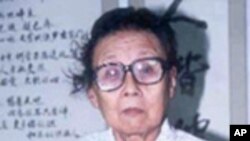Chinese authorities have prevented AIDS activist Gao Yaojie from traveling to the United States to receive an award. Dr. Gao, who is eighty, has been confined to her apartment in the central Chinese city of Zhengzhou since February 1st. Dr. Gao was notified in October that she would be honored by the Vital Voices Global Partnership, a non-profit women's advocacy group. She had planned to attend the awards ceremony along with three other Chinese women who are also being recognized at a March 14th ceremony at the Kennedy Center in Washington.
Dr. Gao gained prominence after she helped expose a blood-selling program in central China during the 1990s. Through the program, tens of thousands of farmers became infected with H-I-V, the virus that causes AIDS. Operators often used dirty needles, and people selling plasma received replenishment from a pooled blood supply. Dr. Gao spent years traveling to villages in Henan province, handing out information about AIDS, helping orphans, and providing medicine. She is credited with helping to force the Chinese government to confront the spread of H-I-V.
In recent years, the Chinese government has confronted the spread of H-I-V/AIDS more openly. The government has banned blood sales and discrimination against people with the virus. Nevertheless, AIDS workers face frequent harassment by local authorities who fear their activism will reflect badly on them.
This is not the first time that Chinese officials have prevented Dr. Gao from traveling to accept awards. In 2001, she was barred from going to Washington to receive an international AIDS award. And in 2003, Dr. Gao was not permitted to accept a public service award in the Philippines.
It is unfortunate that in spite of greater openness about the spread of H-I-V/AIDS in China, authorities are still trying to keep Dr. Gao from traveling. Freedom of travel and speech are fundamental human rights. "No one," says U.S. State Department spokesman Tom Casey says, "should suffer for simply expressing their views, for raising concerns about government policies, and for advocating for the redress of grievances."












